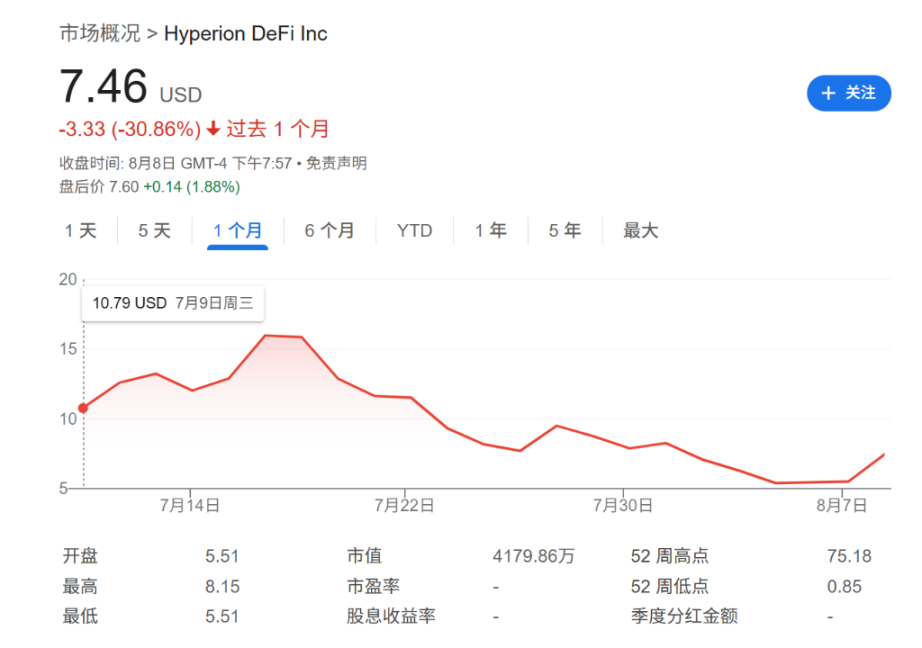Author: Zhang Yaqi
Source: Wall Street Watch
The "treasury company" model, where listed entities hold large amounts of cryptocurrency, is showing signs of fatigue after the frenzy of the first half of the year, with the stock prices relative to their held crypto assets experiencing a significant contraction.
Recent developments indicate that the pioneer in this field, MicroStrategy, has seen its stock price premium noticeably decline. In May of this year, its stock price reached twice the value of its Bitcoin holdings, but this premium has now dropped to 1.75 times. Other followers, including Bitcoin holder Semler Scientific and Solana holder Upexi, have generally seen their stock price premiums decline in recent weeks, with some companies' premiums even disappearing, causing their stock prices to fall below the value of their crypto assets.
Despite the cooling market sentiment, treasury companies still wield significant influence in the capital markets. According to data from crypto consulting firm Architect Partners, U.S. publicly listed companies have announced plans to raise over $91 billion this year for the purchase of cryptocurrencies. According to Dealogic data, this figure far exceeds the $38 billion raised in the traditional U.S. IPO market during the same period.
However, the subtle changes in the market cannot be ignored. Some companies holding non-mainstream tokens have seen their stock prices fall below their net asset values, highlighting a divergence in investor sentiment. The risk of this model lies in the fact that once stock prices turn to a discount, companies will face difficulties in refinancing, which will also exacerbate the linkage risk between the traditional stock market and the crypto market.
Financing Frenzy Outshines IPOs, but Market Shows Signs of Fatigue
"Crypto treasury stocks" have become a label for over 160 publicly listed companies worldwide, providing investors with a way to gain exposure to cryptocurrencies without directly purchasing tokens, functioning similarly to cryptocurrency exchange-traded funds (ETFs). Companies have been buying Bitcoin for years, and the soaring cryptocurrency prices this year have triggered a new issuance frenzy.
Cosmo Jiang, a general partner at crypto fund Pantera, stated:
"These digital asset tools have almost sucked all the oxygen out of the market; it's the only thing people are talking about."
Pantera has invested hundreds of millions of dollars in over 10 crypto treasury stocks this year.
However, signs of market cooling are becoming clear. Josh Solesbury, vice president of ParaFi, noted that reduced trading volumes during the summer and an increasing number of options in the market are the main reasons for the decline in stock price premiums. Steve Kurz, global head of asset management at Galaxy Digital, believes:
"The market is showing some signs of fatigue, but I don't think this wave has run out of steam. The market will see differentiation, with winners-take-all scenarios emerging in different verticals."
Divergence in Performance Between Mainstream and Alternative Token Holding Companies
The cooling of the market is not uniform but shows significant structural differentiation. Companies holding mainstream tokens are performing far better than those betting on niche, high-risk tokens.
Data from Architect Partners shows that crypto treasury stocks holding mainstream tokens like Bitcoin, Ethereum, or Solana have a median return of 92.8% since announcing their holding strategies.
In contrast, a group of crypto treasury stocks investing in lesser-known tokens has a median return of negative 24% since their announcements. A typical example is Hyperion DeFi, which was formerly a biopharmaceutical company, Eyenovia, and began acquiring hyperliquid tokens in June of this year. Although the tokens it holds are currently valued at nearly $60 million, the company's market capitalization is only $30.5 million. Over the past month, its stock price has plummeted by 30%.

Increased Correlation, Heightened Market Volatility Risks
The inherent risks of the "coin hoarding" model are becoming apparent. When a company's stock price is at a premium relative to its assets, it is easy to raise funds by issuing more shares to purchase additional cryptocurrencies. However, once the stock price turns to a discount, this virtuous cycle reverses, making it difficult for the company to raise new funds. At the same time, a decline in the value of the underlying tokens will further pressure the company's stock price, creating a negative cycle.
The rise of this model has also deepened the correlation between the traditional stock market and the crypto market, potentially introducing new sources of volatility to the stock market. Matt Zhang, founder of Hivemind, warned:
"As this integration deepens, traditional stock investors will face many unprecedented risks. They may not be accustomed to certain tokens dropping 15% in a single day, which happens frequently in the crypto space."
Some venture capital firms are taking a cautious approach to such investments. Nic Carter, founding partner of crypto venture capital firm Castle Island Ventures, stated that they have been avoiding crypto treasury stocks. He believes:
"These businesses are largely zero-sum games, with returns primarily coming from increasing leverage or allowing retail investors to buy in at unfavorable prices, which we believe carries a certain reputational risk."
免责声明:本文章仅代表作者个人观点,不代表本平台的立场和观点。本文章仅供信息分享,不构成对任何人的任何投资建议。用户与作者之间的任何争议,与本平台无关。如网页中刊载的文章或图片涉及侵权,请提供相关的权利证明和身份证明发送邮件到support@aicoin.com,本平台相关工作人员将会进行核查。




